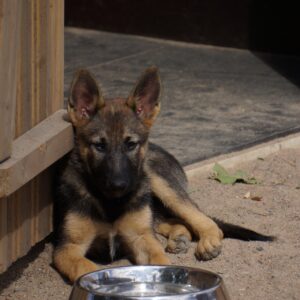Welcoming a new puppy into your home is an exciting time, but it can also come with the challenge of house training. One of the most common and frustrating issues that new dog owners face is dealing with their puppy peeing in the house. This not only disrupts the housekeeping but can also be a sign of underlying health or behavioral issues.
In this comprehensive guide, we’ll walk you through the reasons your pup might be having accidents indoors and provide effective strategies to prevent, manage, and clean up those unwanted messes. With patience, consistency, and the right approach, you can help your puppy become a house-trained superstar.
Table of Contents
Understanding Why Puppies Pee in the House
Before we can fix the problem, we need to understand why it’s happening in the first place. There are several common reasons why puppies have accidents inside.
Lack of Bladder Control
Young puppies have very small bladders and limited control over their bodily functions. It’s natural for them to have frequent urination, and sometimes they can’t hold it until they’re outside.
Unfamiliar Environments
Puppies, especially when they’re first brought home, might feel vulnerable and uncertain in their new space. This can lead to nervous peeing as a way to mark territory or as a submission gesture.
Overexcitement or Playfulness
Puppies tend to get overly excited, which can sometimes lead to accidental urination. This often happens when they’re playing with you or meeting someone new. This is not purposeful on the dogs part.
Lack of Established Routine
Consistency is key in all forms of training. If your puppy doesn’t have a set schedule for bathroom breaks, they may not understand where they should be going.
House Training Basics
The most effective way to handle puppy peeing in the house is to establish a structured routine and use methods that encourage your puppy to do their business outside. Your puppy should never be out of his crate unless you are actively interacting with him.
Establishing a Routine
Take your puppy outside at regular, scheduled intervals, including after they wake up, after they eat, and after playtime. Be patient and wait with them until they go, then praise them lavishly when they do. If you fail to follow a routine and your puppy has an accident it’s your failure not the dogs.
Crate Training
A properly introduced and used crate can become your puppy’s safe space and sleeping area, but it’s also a useful tool for potty training. Dogs instinctively avoid soiling their den, so a correctly sized crate can teach them to hold it until they’re taken outside.
Positive Reinforcement
When your puppy pees outside, offer plenty of praise, maybe even a treat. Positive associations with going outside will encourage them to repeat this behavior.
Dealing with Accidents
No matter how diligent you are, accidents will happen. It’s essential to handle them correctly to minimize confusion and stress for your puppy.
Immediate Actions
If you catch your puppy in the act, interrupt them with a gentle “no,” and take them outside to finish. If you find the mess after the fact, there’s nothing you can do; clean it up and move on.
Cleaning Tips for Removing Odors
Regular cleaning products might not erase the scent of urine completely, and the lingering odor can signal to your puppy that the spot is a bathroom. Use enzymatic cleaners to thoroughly remove the smell and discourage repeat accidents.
Troubleshooting Persistent Issues
If your puppy continues to have frequent accidents despite your efforts, it’s time to consider and rule out other factors.
Health Concerns
Sometimes, urinating in the house can be a sign of a urinary tract infection or other health issue. If accidents persist, consult your vet to rule out any medical conditions.
Behavioral Problems
In some cases, indoor peeing might be related to stress or anxiety. For instance some dogs stress pee. This is autonomic nervous system reaction and a sign of submission which they have no control over. Correcting a dog in this situation is likely to make the condition worse. If your puppy is struggling with separation anxiety or other behavioral issues, work with a professional trainer to address these specifically.
Long-Term Prevention Strategies
Once the basics of house training are mastered, you can take additional steps to reinforce good behavior and prevent setbacks.
Consistency in Training
Stick to your puppy’s established routine even as they get older. This helps maintain their good toilet habits and prevents them from getting confused.
Advanced Techniques for Reinforcement
Some dog owners find success with bell training, where the puppy rings a bell to signal they need to go outside. While this method isn’t necessary for every dog, it can be a fun and effective communication tool.
Understanding the “Tell”
Every dog has a signal they give when they need to go out, whether it’s a scratch at the door or a certain behavior. Learn your puppy’s “tell,” and respond quickly to avoid accidents.
Encouragement for New Dog Owners
Puppy training, including house training, takes time and lots of repetition. It’s a learning process for both you and your pet. Be patient, persistent, and remember that accidents are part of the package when it comes to raising a puppy. With the right attitude and approach, you’ll soon find that your puppy is capable of learning where it’s appropriate to go to the bathroom—and you’ve both earned a pat on the back (or head) for a job well done.
Remember, the key to success with puppy training is setting up a routine, remaining patient, and understanding that accidents are part of learning. If your puppy has an accident it is most likely your failure not the dogs. By focusing on positive reinforcement and consistent training, you’ll be well on your way to a cleaner, more harmonious home with your furry friend. Happy training, and here’s to a future with far fewer cleanup days!


